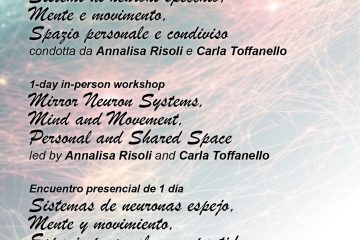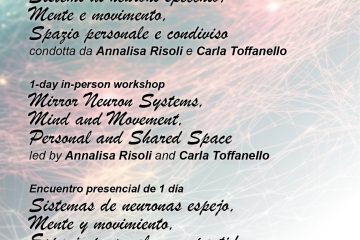The Municipal Social Service was subjected to a series of organizational changes, which implied a new operational modality for the individual Social Workers and the reconstitution of a new working group.
The transformations that had been implemented, sometimes too quickly and sometimes too slowly, caused fatigue for the operators involved.
All change gives rise to stress and requires an additional effort that can sometimes be overwhelming and change is almost always experienced as such.
This stress is added to the specific fatigue of those who work with people bearing pain and suffering.
https://www.erickson.it/Libri/Pagine/Scheda-Libro.aspx?ItemId=37120
https://www.researchgate.net/publication/11464879_Burnout_syndrome_in_the_helping_professions
For this reason, Carla Toffanello and I worked on a strategy that, taking into account the current situation of the organization and the type of work of the recipients, could help in addressing a series of specific, problematic issues.
Initially the management accepted the proposal with both perplexity and curiosity. The Social workers involved welcomed it with attention and understanding of what they would have encountered during the sessions.
Initially everyone accepted the proposal for a specific intervention that took into account the needs of the operators and the Organization as a whole.
How the intervention took place:
The preparation of the project was shared with a Professional Social Worker and a Pedagogue, both with long and qualified experience in the field of the helping and training professions.
Furthermore, the two professionals followed the progress of the project to validate its objectives and to direct the intervention, if necessary.
The first proposal was evaluated by the managers of the services, as well as by two Focus Groups that had been created from two distinct working groups. The Coordinators and the Social Workers from the two different Zones that adhered to the proposal were present. These meetings permitted us to have a first review of the experiential/training offer. The initial proposal was revised and personalized on the basis of what had emerged.
Two checks were scheduled: one halfway through the course and one at the end.
The theme of the intervention:
It was agreed that the unifying theme of the training intervention would be: “Working in the flow“.
The project “Working in the flow” aimed to create a welcoming and purposeful context to “generate self expression”, and “generate dance”, but also to give space to the creation of affective relationships among the Social Workers, an indispensable capacity for professionals in the helping profession.
After a few meetings the Social Workers shared our strong point that was our goal:
If this positive flow can be experienced, once a week, in a welcoming, supportive group context, and without judgments, we are sure that:
a positive effect of well-being will be generated at work;
• the operators will experience reduced stress;
• work satisfaction will increase.
Biodanza in the helping professions.
Biodanza develops those personal and social skills already present in individuals that are sometimes inhibited or poorly developed.
These skills essentially serve the person and the society, but they play a very important role in the helping professions, constituting an essential professional baggage.
Too often, in social work, the suffering with which we come into contact affects the worker who tends to “lock him or herself” into a “rational/professional” costume that denies feelings, interpreting them as “a disturbance to professionalism”.
But dialogue with one’s emotions is, fortunately, recognized as being essential for the same understanding of the person needing help.
In their “toolbox” the social worker cannot neglect the skills related to the relating.
The exercises and sessions of Biodanza stimulate the psychophysical unity of the person, their vitality, and their ability to relate to other people with empathy, to connect positively to their group of membership. In other words, they help the human being, who is a relational and social creature, to develop their personal abilities.
Social Workers_The construction of the group
Through exercises that involve the whole person in the here and now, the internal equilibrium is restored in a global and fluid way, allowing those who perform a helping role to remain whole, and coherent in the often painful and problematic relationship that they have with those in serious difficulty or marginalization.
Furthermore, every single session provides the opportunity to relax and find a greater connection with oneself, which is decisive for the reduction of work stress.
BASIC ASSUMPTION:
Work is “fluid” when it involves:
- Competence.
work allows us to express our skills, our expertise. It is a commitment that frees up energy, develops additional skills, and allows us to express our creativity in the search for appropriate solutions. - The pleasure/well-being principle
during work one is in a condition where the effort made is pleasant and does not “draw energy”. On the contrary, it can offer wellbeing in the work commitment because it allows contact with the “playful”, vital part, which gives satisfaction, which recognizes personal self-esteem, and that makes living that feeling of approval of our abilities.
• Values
the end results, or even just the goals that are pursued, respond to our basic values, which gives a sense and meaning to our work.
Biodanza and fluidity at work:
Let’s have a look at how Biodanza acts on these three components of fluid work taking into account that
- the exercises have a solely positive experiential component related to music and movement.
• The actual experience generated by the exercises is felt and then disseminated, also in the personal and work contexts.
With Biodanza, among other things, there is the experience of:
- Empathy, the ability to listen to the other, to understand their “inner movements” or, at least, to be ready to do so.
- Feedback, the ability to relate, listening to the other and expressing their personal condition, with reciprocity.
- Respect, for oneself and for others, understood as awareness of the times and ways that everyone has to express their potential, without the expectation of a pre-established performance and without judgment on the competence of each participant.
- A collaborating group, which supports, reinforces, and allows constructive confrontation and expressive freedom.
• An awareness of oneself and others, with an absence of the judgments that seek fault as a tool to strengthen personal competences, and consolidate constructive relationships. This awareness is an even more necessary instrument in a reorganization phase in which the organizational framework is not stable. - Reinforcement of a person’s role in the group,
- Strengthening of self-esteem and determination, both necessary to support constructive and healthy working relationships with colleagues and clients.
Social Workers_Dancing with pleasure and freedom in the group
The guide for action must see that the “reality principle” comes together with an attention to organizational well-being, which is expressed through the “pleasure principle”, that is the opposite of stress.
Biodanza on this path has been tested for:
- self-regulation as a process that favours states of alternation between activity and rest with the aim of producing psychophysical well-being.
- fluidity being the ability to flow in order to find different solutions and answers to difficulties.
- Affective communication through the feedback.
• Mutual respect based on self-respect.
• The attention and support relationship with the other
• Equality in the relationship
• Solidarity between members of the group
• The search for the beautiful and pleasant that is found in positive relationships
• The experience of knowledge based on affectivity and not just on rationality.
This teaching offer for Social Workers:
- It was a moment for the “recovery of strength” that, with lightness and fluidity, allowed the recapture of some of that personal, relational and work energy that had sacrificed itself for the change taking place.
- It was a formative moment that allowed for the expression and reflection on the essential relational skills that are essential in a helping job.
• It allowed the acceleration of the formation of the new working group.
FINAL CONSIDERATIONS
The experience was conducted with three distinct work groups of Social Workers (two specific groups from two different Zones and one with Social Workers from several Zones) for at least 8 meetings each. At the end there were three further collective meetings of all the participants.
A last collective meeting took place three months later to reinforce the skills acquired or recovered and to verify what was left from the meetings held.
Two essential points emerged strongly:
- full satisfaction with the experience (“these meetings should be mandatory for everyone”);
the request for a continuous work of reinforcement through Biodanza.
For our part we have found that these meetings have been an excellent opportunity for
- the reinforcement of personal identity,
reinforcement of professional relations and
3. the improvement of group work.
Our expectation was related to the consequences of the relationship with the clients, but the
benefits of the acquisitions and knowledge had not been decidedly highlighted, if not by a few Social Workers.
The validity of the requested monthly reinforcement remains unexplored, which in our opinion would have been very appropriate.
Carla Toffanello and Salvatore Mirante.


0 Comments